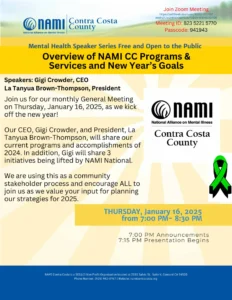Written by Lamisa Zaman, a 2024 NAMI CC Intern
What is Transitional Aged Youth, and How Does NAMI CC Support This Unique Group?
What is Transitional Aged Youth?
According to the World Health Organization, depression, anxiety, and behavioral disorders are among the leading causes of illness and disability among adolescents (WHO, 2021). These conditions can be debilitating for young people, limiting their future aspirations. At NAMI Contra Costa (NAMI CC), we refer to this vulnerable group as the Transitional Age Youth, commonly abbreviated as TAY, this age group encompasses individuals aged 16-29. TAY faces the challenge of navigating the junction between adolescence and adulthood, often having to adapt to significant life changes. The constant exposure to an unstable and ever-changing environment further increases the risk of mental illness among these young individuals.
The importance of a stable environment in the mental health of TAY is underscored by numerous studies. For instance, a publication from the National Academies of Sciences, Engineering, and Medicine writes that environment, both physical and social helps serve as a baseline for how individuals experience and respond to stress (Shelton-Davenport, M. et.al., 2021). This highlights one of the many struggles among TAY, as unstable environments can negatively impact their responses to stress. Which, in turn, exacerbates the prevalence of mental health issues such as depression, anxiety, etc. Moreover, this publication exemplifies the necessity for young people-centric resources to reduce these detrimental effects.
The growing concern around the mental health of TAY is further supported by the research of Dr. Jean Twenge, a professor of Psychology at San Diego State University. She observes that “U.S. adolescents and young adults in the late 2010s, versus the mid-2000s, experienced serious psychological distress, major depression or suicidal thoughts, and more attempted suicide” (Twenge, J., 2019). This stark increase in mental health issues among young people underscores the importance of providing adequate resources and support systems. For this reason, NAMI CC acknowledges the significance of delicately tackling commonly faced issues among TAY, which may include transitioning through major life stages, academic pressures, and societal expectations.
Issues such as fitting in and adapting to academic pressure are commonly faced by TAY, resonate universally as a TAY myself, I continue to grapple with societal expectations. Through most of high school, I battled with an eating disorder, starving myself to conform to unrealistic standards of thinness. Though I recovered, my experience shaped my desire to help others who found themselves on a similar path.
My drive to help others is shared by many at NAMI CC including Avery Gould, a Transitional Age Youth Volunteer Coordinator for the TAY support group. Gould recalls his experience being diagnosed with bipolar disorder and stated,
There are certain things in this world that we cannot fully understand until we undergo it ourselves, and I’m appreciative that the universe has bestowed me with such experiences…my experiences are my largest strength when it comes to the resources I have to help other people.
Avery Gould, a Transitional Age Youth Volunteer Coordinator, NAMI CC Staff
Despite his turbulent adolescence, Gould remains steadfast in his mission to mentor young people and guide them toward brighter futures. These struggles faced by the youth are deeply traumatic and may lead vulnerable individuals down troubling paths. However, NAMI CC offers mentors who have firsthand experience with these challenges, each being dedicated to empowering TAY with the tools to improve their lives.
The importance of mental health advocacy for TAY cannot be overstated. As a society, we must prioritize the mental well-being of our youth, recognizing that they are the future leaders, innovators, and caregivers. By investing in their mental health, we are investing in a healthier, more resilient future. Organizations like NAMI CC play a crucial role in this effort, providing the resources, support, and advocacy needed to help TAY thrive.
Why It’s Important to Support Transitional Age Youth (TAY)
According to a publication from the International Journal of Environmental Research and Public Health, high emotional support is one of the key predictors of stable mental health for individuals aged 18-29 (Winzer, R., 2018). This publication highlights the importance of addressing the mental health needs of Transitional Age Youth as it is essential for fostering their well-being and supporting their transition to adulthood.
NAMI CC provides adequate tools for young people to address their mental health issues and face drastic life changes with confidence. NAMI CC’s comprehensive approach, which includes general and specialized support groups, educational programs, and peer support, offers a valuable lifeline for TAY facing mental health challenges. By continuing to expand and tailor these resources, we can create a more inclusive and supportive environment for all young people, ensuring they have the support they need to navigate life’s challenges and achieve their full potential.
TAY Resources
NAMI CC works diligently to provide strategies that promote positive mental health, equipping young people to overcome future hardships and adapt to an increasingly digitized world. This organization understands that the challenges faced by TAY are multifaceted and require a comprehensive approach. By offering a wide range of resources tailored for TAY, NAMI CC addresses diverse needs within this age group.
One of the primary resources NAMI CC offers is the TAY support group, which holds meetings on Zoom on Mondays from 6:00 PM – 7:30 PM and in person on Saturdays from 1:00 PM – 2:00 PM. The TAY support group is an exceptional ongoing opportunity, in which facilitators help struggling individuals make sense of their struggles and help find beneficial coping strategies. Recognizing the linguistic diversity in Contra Costa County, the TAY support group is also available in Mandarin. This step towards inclusivity ensures that non-English speaking TAY members receive the support they need in a language they understand, fostering a sense of belonging and community.
More information about the general TAY support group can be found on the NAMI CC website under the “Groups and Services” drop-down menu, followed by the NAMI CC Groups subcategory.
Furthermore, NAMI CC also offers specialized support groups for select demographics to address the systemic factors that may exacerbate mental issues. One such group is the African American Young Women’s Group which meets every third Friday of the month from 6:00 PM – 7:00 PM. This specialized support group’s main focus is to provide young African-American women aged 17-29 an opportunity to have a judgment-free zone to give and receive advice from peers. More information on this group can also be found on the NAMI CC website, under the “Groups and Services”’ drop-down menu followed by the NAMI CC Groups subcategory. From offering different languages to specialized support groups, these efforts are just some ways that NAMI CC works to support the diverse TAY population in Contra Costa County.
The Role of Technology and Social Media on TAY Mental Health
Another essential aspect of supporting TAY is addressing the impact of technology and social media on their mental health. The digital age has transformed the way young people communicate, form relationships, and perceive themselves. While technology offers many benefits, it also presents challenges, such as cyberbullying, social comparison, and internet addiction. NAMI CC recognizes these challenges and incorporates discussions about healthy technology use into the TAY support group meetings. By doing so, they equip TAY with the tools to navigate the digital world safely and maintain their mental health.
One of the key strengths of NAMI CC’s approach is its emphasis on peer support. Peer support involves individuals with lived experience of mental health challenges providing support to others facing similar issues. This approach is particularly effective for TAY, as it fosters a sense of understanding and empathy that is often missing in traditional mental health services. NAMI CC’s peer support programs create a supportive community where young people can share their experiences, learn from each other, and feel less isolated in their struggles. Additionally, with peer support groups, TAY is given a chance to talk about the impact of social media without being pushed aside or ignored.
In addition to support groups, NAMI CC also offers educational workshops and training programs for TAY and their families. One program, in particular, called Family to Family is especially beneficial. This eight-week program covers a wide range of topics, including stress management, coping strategies, and mental health literacy. By educating young people and their families about mental health, NAMI CC empowers TAY to recognize early signs of mental illness, seek help promptly, and support each other effectively.
Conclusion
As a society, prioritizing the mental well-being of our youth is essential. By investing in their mental health, we are not only helping them achieve their full potential but also building a healthier and more resilient future for all. The journey from adolescence to adulthood is fraught with challenges, and the mental health of young people can be significantly impacted by unstable environments, societal pressures, and the digital landscape. Organizations like NAMI Contra Costa (NAMI CC) play an essential role in providing the resources and support necessary to help TAY navigate these complexities.
NAMI CC’s comprehensive approach, which includes support groups, peer mentorship, and educational programs, ensures that TAY have access to the tools they need to manage their mental health and build resilience. These programs remain vital to helping our youth navigate their mental health, and continued support for such initiatives will ensure that TAY receives the care and guidance they need during this critical stage of their lives.
In conclusion, NAMI CC provides a strong foundation for a brighter and healthier future for TAY. By continually diversifying their support programs, NAMI CC ensures that troubled individuals have ample and accessible opportunities to receive the help they need.
References
National Academies of Sciences, Engineering, and Medicine; Division on Earth and Life Studies; Shelton-Davenport M, Bremer A, Andrada A, et al., editors. The Interplay Between Environmental Exposures and Mental Health Outcomes: Proceedings of a Workshop—in Brief. Washington (DC): National Academies Press (US); 2021 Jun 3. Available from: https://www.ncbi.nlm.nih.gov/books/NBK571979/ doi: 10.17226/26201
American Psychological Association; Journal of Abnormal Psychology; Jean M. Twenge, A. Bell Cooper, Thomas E. Joiner, Mary E. Duffy, Sarah G. Binau. Age, Period, and Cohort Trends in Mood Disorder Indicators and Suicide-Related Outcomes in a Nationally Representative Dataset, 2005–2017: https://psycnet.apa.org/manuscript/2019-12578-001.pdf
Winzer, Regina et al. “What Predicts Stable Mental Health in the 18⁻29 Age Group Compared to Older Age Groups? Results from the Stockholm Public Health Cohort 2002⁻2014.” International journal of environmental research and public health vol. 15,12 2859. 14 Dec. 2018, doi:10.3390/ijerph15122859
World Health Organization. (2021, November 17). Mental health of adolescents. https://www.who.int/news-room/fact-sheets/detail/adolescent-mental-health


